 Browns Archive
Browns Archive  Blast From The Past: Chris Spielman - Instant Impact
Blast From The Past: Chris Spielman - Instant Impact
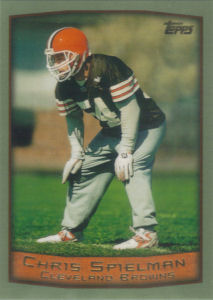 Question: What do Ernie Davis, Robert Popelka, and Chris Spielman have in common?
Question: What do Ernie Davis, Robert Popelka, and Chris Spielman have in common?
You may know the Ernie Davis story, recently reintroduced to public awareness through the release of the move, The Express. Davis had just won the Heisman Trophy in 1961 as a running back who’d succeeded Jim Brown at Syracuse. He was the first black player to win the award. He was drafted by the Washington Redskins and promptly traded to the Cleveland Browns for future Hall of Famer Bobby Mitchell. Davis suffered from leukemia and died in 1963.
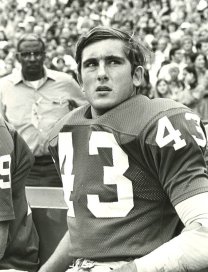 Robert Popelka? He was a running back in high school with a ton of speed. Southern Methodist University signed him in 1969 and tried him out at safety. As a backup in 1970, it is said he blasted a receiver so hard that it stopped practice while the entire team ooh-ed and ahh-ed. Some began calling him “Pop-a-lick”. The Browns drafted the All-American in 1973, in the 14th round. Since my name matches his, I like to think we’re related. Since my speed does not match his, I pretty much know we’re not.
Robert Popelka? He was a running back in high school with a ton of speed. Southern Methodist University signed him in 1969 and tried him out at safety. As a backup in 1970, it is said he blasted a receiver so hard that it stopped practice while the entire team ooh-ed and ahh-ed. Some began calling him “Pop-a-lick”. The Browns drafted the All-American in 1973, in the 14th round. Since my name matches his, I like to think we’re related. Since my speed does not match his, I pretty much know we’re not.
Chris Spielman was an established NFL linebacker when the New Browns acquired him for their inaugural season of 1999.
Answer to the question above: These are my three favorite Browns who never played for them in a regular season game.
Spielman is the only one I’ve ever seen play. And he’s earned his rank as number one in my mind.
Many Ohio football fans have known who Chris Spielman is for thirty years now. After having grown up in Canton, he burst on the scene at Washington High School in Massillon. Some maintain that the school recruited him and his brother Rick by hiring his father Sonny as a teacher and coach.
Sonny Spielman had been a long-time head coach at Timken High School in Canton. He is credited for the last run of success the football program had, back in the ‘70s. The elder Spielman was an intense, maximum-effort coach. His motto is said to have been, “you gotta love it” as the way to success in football.
At Massillon, Chris Spielman starred as a running back and as a linebacker. His team appeared in the state championship game in 1982, falling to perennial power Cincinnati Moeller and coach Gerry Faust. The loss wasn’t for lack of effort from Spielman; Massillon head coach Mike Currence has noted that his prized linebacker was his defense’s only decent matchup vs. Moeller’s future Notre Dame golden-domers Hiawatha and D’Juan Francisco. Spielman joked that Massillon had become the ’public school champions’. Spielman was highly decorated for his play at Massillon, and even though he didn’t have prototypical size and speed, countless colleges recruited him. He had the quintessential ‘high motor’, pacing the sidelines even after being removed from games during garbage time. He was a legend in his own time, even appearing on a Wheaties box while in high school.
At one point, it appeared Bo Schembechler was about to land the recruit for Michigan. Spielman’s father joined Currence in counseling the player to sign with The Ohio State Buckeyes. OSU coach Earl Bruce speaks about how Spielman hesitated on the telephone when he called him with his decision. After the pause, Spielman declared, “I’m gonna be a Buckeye!”
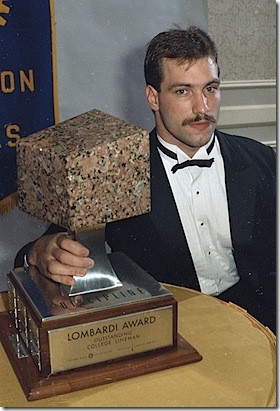 Chris Spielman was a freshman in 1984. In the opening game, the Bucks were getting gashed by the short passing attack of Oregon State. Spielman reportedly asked repeatedly to enter the game, and Bruce finally relented after the half. On one memorable play, Spielman sacked the quarterback from the blind side and forced a fumble that the Buckeyes recovered. They came from behind to take momentum and win that game.While Spielman spent much of that season sidelined with injuries, his legend grew.
Chris Spielman was a freshman in 1984. In the opening game, the Bucks were getting gashed by the short passing attack of Oregon State. Spielman reportedly asked repeatedly to enter the game, and Bruce finally relented after the half. On one memorable play, Spielman sacked the quarterback from the blind side and forced a fumble that the Buckeyes recovered. They came from behind to take momentum and win that game.While Spielman spent much of that season sidelined with injuries, his legend grew.
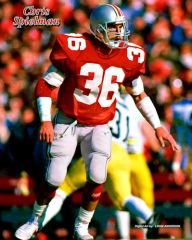 Spielman’s immediate success as a Buckeye shocked even Mike Currence. The early promise shown by the linebacker translated to his being named AP First Team All-American in both his junior and senior years. He also won the Lombardi Trophy in 1987, identifying him as the best defensive front-seven player in college. As a junior, he recorded 29 tackles in the loss to Michigan- which tied him with Tom Cousineau as the single-game leader in tackles by a Buckeye. Spielman’s college play would result in his selection as a first-ballot inductee into the College Football Hall of Fame in 2009 (others in that class included Notre Dame’s Tim Brown and Miami’s Gino Torretta).
Spielman’s immediate success as a Buckeye shocked even Mike Currence. The early promise shown by the linebacker translated to his being named AP First Team All-American in both his junior and senior years. He also won the Lombardi Trophy in 1987, identifying him as the best defensive front-seven player in college. As a junior, he recorded 29 tackles in the loss to Michigan- which tied him with Tom Cousineau as the single-game leader in tackles by a Buckeye. Spielman’s college play would result in his selection as a first-ballot inductee into the College Football Hall of Fame in 2009 (others in that class included Notre Dame’s Tim Brown and Miami’s Gino Torretta).
As Chris Spielman graduated from Ohio State and entered the NFL draft, some observers weren’t sold on him as a top pro prospect. Draftnik Mel Kiper has spoken about how Spielman was a notable “miss” in his annual predictions. The Detroit Lions made Spielman the 28th pick in 1988; that made him a high second rounder (and Michigan got their man after all!).
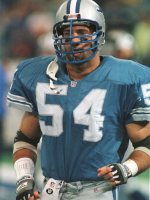 Of course, Chris Spielman’s 100% effort and intensity translated very well to the pro game. He played eight seasons in Detroit. He was the first Lion to record more than 1,000 tackles, averaging 142 per season. He was the team tackling leader in every season from 1988 through 1994. He made the Pro Bowl four times. The Lions had some success while Spielman was there, appearing in one NFC Championship Game.
Of course, Chris Spielman’s 100% effort and intensity translated very well to the pro game. He played eight seasons in Detroit. He was the first Lion to record more than 1,000 tackles, averaging 142 per season. He was the team tackling leader in every season from 1988 through 1994. He made the Pro Bowl four times. The Lions had some success while Spielman was there, appearing in one NFC Championship Game.
The defensive star became a free agent in 1996. Cornelius Bennett of the Buffalo Bills had just moved on to Atlanta, and the Bills signed Spielman. This was hardly the end of the line for Spielman-he led his new team in tackles his first season.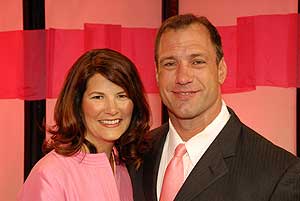 The following year, he suffered a neck injury and didn‘t play much. Famously, the player sat out the following season as well- in support of his wife Stefanie and their young children. His wife was waging a fierce battle with breast cancer, and Chris Spielman knew his presence was needed at home.
The following year, he suffered a neck injury and didn‘t play much. Famously, the player sat out the following season as well- in support of his wife Stefanie and their young children. His wife was waging a fierce battle with breast cancer, and Chris Spielman knew his presence was needed at home.
By 1999, Stefanie was in remission. The outlook was positive. Chris looked to play NFL football once again. This time, the expansion Cleveland Browns were interested. Browns fans- many who followed Spielman as a high school player and especially as a Buckeye- were already giddy over their new team. And now they were going to get Chris Spielman? The anticipation soared.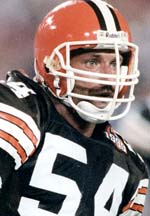 In his book Tales From the Browns Sideline, author Tony Grossi recounts the Browns’ skepticism when Chris Spielman asked to come to Cleveland to anchor the defense. General manager Dwight Clark wondered if Spielman could still play- and if he was healthy. And if he needed to be cut, would the fans stand for it? Spielman assured Clark that he would know when to walk away on his own. Clark traded Buffalo a low draft choice for Spielman, and signed the player to a three-year contract on the same day the Browns signed two other free agents- defensive back Corey Fuller and offensive tackle Orlando Brown (who‘d been with the original Browns when they‘d been moved by Art Modell to Baltimore).
In his book Tales From the Browns Sideline, author Tony Grossi recounts the Browns’ skepticism when Chris Spielman asked to come to Cleveland to anchor the defense. General manager Dwight Clark wondered if Spielman could still play- and if he was healthy. And if he needed to be cut, would the fans stand for it? Spielman assured Clark that he would know when to walk away on his own. Clark traded Buffalo a low draft choice for Spielman, and signed the player to a three-year contract on the same day the Browns signed two other free agents- defensive back Corey Fuller and offensive tackle Orlando Brown (who‘d been with the original Browns when they‘d been moved by Art Modell to Baltimore).
As with every stop in Spielman’s career, he had an instant impact on the Browns. He was a workout warrior, and his level of commitment made him a role model to the entire team. Very early in camp, he collided with fullback Tarek Saleh, and stayed on the ground for a few moments. Practice quieted as Spielman slowly walked to the trainer’s room. That was where he remained until well after practice ended- when he reappeared and returned to the field. He was seen hitting the blocking sled repeatedly and methodically with his shoulder pads. When he was finished, he again walked slowly away.
Spielman continued to play some during the 1999 exhibition season. In game three against the Chicago Bears, the Saleh hit proved to have been a foreshadowing of what was to come. Changing direction on a screen pass play, Spielman was blindsided by Bears center Casey Wiegmann and lay paralyzed for a couple of minutes. Spielman later recalled that Wiegmann attempted to help him to his feet- he intended to bounce right up and get the next defensive call from the sideline, but he was unable.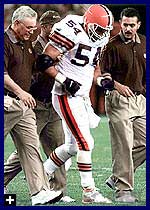 He was determined not to quit. He walked into head coach Chris Palmer’s office the next morning and announced he still intended to play. He later changed his mind, and retired within 48 hours. The reaction was disappointment, but also an overriding relief - from his coaches; to teammates; to many fans. Famously, his five-year-old daughter asked him not to need a wheelchair. She wanted him to be able to swim with her.
He was determined not to quit. He walked into head coach Chris Palmer’s office the next morning and announced he still intended to play. He later changed his mind, and retired within 48 hours. The reaction was disappointment, but also an overriding relief - from his coaches; to teammates; to many fans. Famously, his five-year-old daughter asked him not to need a wheelchair. She wanted him to be able to swim with her.
Spielman had spinal discs that were compressed and were susceptible to future damage. Also, he has disclosed that he’d experienced temporary paralysis back in 1996 as well. He was now being told by doctors that if he were their son, they wouldn’t let him play. He thought a lot about the Mike Utley situation as he decided what to do (Spielman had been Utley's teammate).
The player showed his determination all the way to the end, exclaiming that he didn’t retire- he was forced from the game.
The Browns offered Spielman a non-playing position on the team, but he decided to step back and weigh his options. For instance, he would spend a year coaching an Arena Football League team.
Spielman’s wife Stefanie did succumb to breast cancer, in 2009 after battling the disease for the fifth time. The Spielmans’ years of raising money in support of a cure for cancer continues; you can go here to check that out.
Today, Chris Spielman is a quality announcer for ESPN college football telecasts. His brother Rick (who had tried out with the Lions while Chris was there) also spent a short time with ESPN, and worked his way into NFL scouting. Today, Rick is the Vice President of Player Personnel of the Minnesota Vikings. A couple of his player moves have included the drafting of Adrian Peterson in 2007 (after the Browns selected Joe Thomas), and the signing of Brett Favre in 2009.
I suppose you could say the entire Spielman clan delivers an impact.
Thank you for reading.
http://www.youtube.com/watch?v=i9aSFIMbUmY
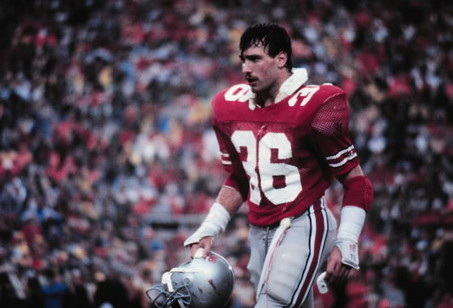
- NBA Announces 2013-2014 Schedule
- Browns Ink Sharknado
- Sharknado A No-Show For Rookie Camp
- Trent Richardson Out Until Training Camp
- Browns Sign Brandon Jackson
- Carrasco Suspended Eight Games
- Browns Add to Wide Receiver Depth with David Nelson
- Browns Need to Learn from Past Draft Mistakes
- Browns Release Chris Gocong and Usama Young
- Browns Missing on Grimes Disappointing, But Not The End
The TCF Forums
- Official- Browns Coach Search/Rumors
mattvan1 (Tuesday, January 21 2014 1:19 PM) - Movies coming out
rebelwithoutaclue (Tuesday, January 21 2014 12:56 PM) - 2015 Recruiting
jclvd_23 (Tuesday, January 21 2014 12:38 PM) - The 2014 Offseason Thread
Larvell Blanks (Tuesday, January 21 2014 12:25 PM) - Chris Grant's first 3 drafts
Kingpin74 (Tuesday, January 21 2014 10:13 AM) - Mike Brown
YahooFanChicago (Monday, January 20 2014 11:15 PM) - 2014 Hoops Hockey Hijinx
jpd1224 (Monday, January 20 2014 4:44 PM) - 2014 Recruiting
jclvd_23 (Monday, January 20 2014 2:26 PM) - Wish List - #4 Pick
Hikohadon (Monday, January 20 2014 1:26 PM) - #1 overall pick Anthony Bennett
TouchEmAllTime (Sunday, January 19 2014 1:28 PM)



